
Fate of end-of-life care lies in hands of Upper House MPs as safeguards are stripped from Bill
Archbishop Anthony Fisher OP will urge members of the NSW Upper House not to pass proposed assisted suicide and euthanasia laws when he appears before its inquiry into the current bill this month.
Pro-life leaders say the stakes are higher following the passage of the proposed laws through the Lower House on 26 November which stripped it of many potential safeguards.
About 70 amendments intended to ameliorate the bill’s effect on the vulnerable were voted down before the bill passed the lower house with 52 MPs in favour and 32, including Premier Dominic Perrottet and Opposition Leader Chris Minns, voting against it.
Last week Catholic Health Australia condemned the decision by the bill’s author Alex Greenwich, his co-sponsors and supporters, to vote down many amendments aimed at strengthening safeguards in the bill.
“This bill was weak when it went into the chamber, but what has emerged is alarming” – CHA chair John Watkins
These included the need for a specialist to give a diagnosis, stronger protections around decision-making capacity, the detection of coercion and preventing health workers from initiating a discussion around euthanasia.
“This bill was weak when it went into the chamber, but what has emerged is alarming,” said Catholic Health Australia chair John Watkins. “We are very disappointed that the Lower House has seen to vote through the bill, but what is especially regrettable is that it goes through shorn of all protections for the vulnerable.
Members of Parliament put forward a number of amendments designed to ensure that whatever bill goes forward actually has proper safeguards to protect the vulnerable from coercion and ensure people who are ineligible do not get pushed towards voluntary assisted dying.”
Dr Bernadette Tobin: Legalise Euthanasia: watch it break out
CHA’s acting director of strategy and mission Nicole Clements said that if the bill becomes law there’s a “very real risk” that the elderly and infirm, the depressed, those suffering from dementia or who simply feel a burden to others, will be encouraged to opt for an early death.
She also said that due to a lack of funding, a person’s palliative care access depends on his or her postcode, meaning that most rural and remote NSW residents miss out.
“We have made a submission to the Upper House committee and will make ourselves available to appear at any public hearings,” she told The Catholic Weekly. “It is vital that the voice of Catholic health and aged care providers is heard in the Parliament and that we advocate for the vulnerable among us who we believe will be put at risk as a result of this Bill. This bill is not a compassionate direction for our state.”
Director of the anti-euthanasia group, Hope, Branka van der Linden said that despite a small number of members putting forward amendments “to make a bad bill better”, many sensible safeguards were rejected by “pro-euthanasia MPs, determined to ram the bill through Parliament before Christmas”.
“Let’s hope the Upper House inquiry, which is also caught up in the pre-Christmas parliamentary rush, considers these amendments more carefully,” she said.
All MPs are being given a conscience vote on the bill with those concerned about the effects of legal assisted suicide and euthanasia encouraged to inform Upper House MPs of their opposition to it. Archbishop Fisher says euthanasia and suicide laws can never be made safe and “non-lethal” approaches to suffering for the terminally ill are needed, such as improved access to quality palliative care.
The inquiry ends on the 13 December with the report due to parliament on 22 February.
Amendments voted down in the Lower House included:
• That healthcare workers not be allowed to initiate a discussion about euthanasia or assisted suicide with their patients. (A similar safeguard exists in Victoria)
• That a person must be suffering physically (although a person could be suffering in other ways as well)
• For a person to be diagnosed with a disease, illness or condition that will likely cause death in six months, they must be diagnosed by a specialist in that disease, illness or condition.
• To make it clear that a disability or a mental health impairment is not a disease, illness or medical condition that would make a person eligible for the scheme.
